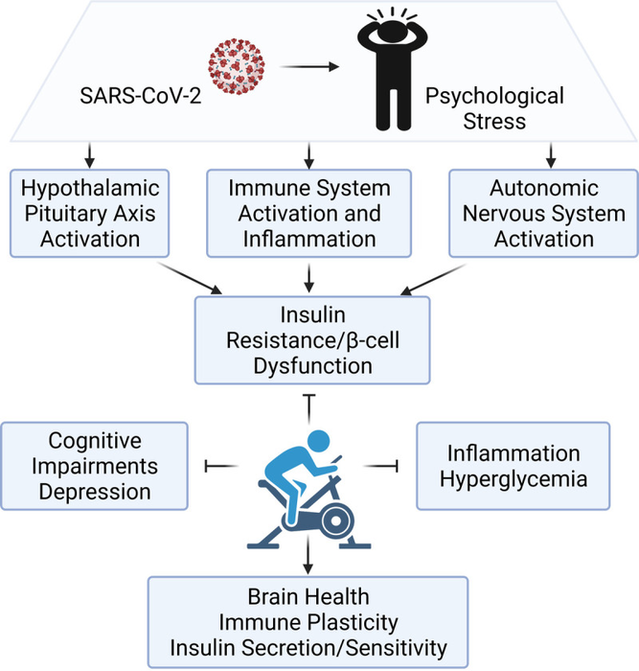Depression
Do You Have Long COVID? Exercise May Help
Exercise may break long COVID's vicious cycle by reducing hyperinflammation.
Posted March 12, 2022 Reviewed by Tyler Woods
Key points
- About 54% of COVID-19 survivors experience post-acute sequelae of SARS-CoV-2 ("long COVID") months after their initial recovery.
- Long COVID causes hyperinflammation, which increases people's risk of brain fog, depression, and diabetes.
- Doing about 30 minutes of moderate exercise (e.g., walking) can reduce inflammation and may help to alleviate long COVID symptoms.

Post-acute sequelae of COVID-19 (PASC)—also known as long COVID—can trigger a chronic hyperinflammatory state, immune system dysregulation, brain fog, and psychological distress. Sequelae means "the consequences of a previous disease or illness."
The persistent neuroendocrine symptoms of long COVID are associated with an increased risk of depression and new-onset diabetes months after someone has recovered from the initial SARS-CoV-2 infection.
It's unclear how many people experience long COVID symptoms. Last year, a systematic review (Groff et al., 2021) found that about 54 percent of COVID-19 survivors were experiencing PASC six months after their initial recovery.
A new paper (Rebello et al., 2022) hypothesizes that exercise may help break long COVID's vicious cycle by reducing inflammation and enhancing immunosurveillance in ways that improve mental health outcomes and offset diabetes risk. This hypothesis was recently published online ahead of print in the peer-reviewed journal Exercise and Sports Science Reviews.
Exercise Induces Anti-Inflammatory Factors That May Reduce Long COVID Symptoms
"We hypothesize that exercise counters the neuropsychiatric and endocrine sequelae of long COVID by inducing the release of circulating factors that mediate the anti-inflammatory response, support brain homeostasis, and increase insulin sensitivity," the authors write in their paper's abstract.

Rebello et al. posit that long COVID perpetuates psychological distress via a "triple whammy" of increasing hypothalamic-pituitary-adrenal (HPA) axis activity, reducing parasympathetic nervous system activity, and triggering immune system dysregulation. HPA axis overactivity increases sympathetic nervous system stress responses and promotes systemic inflammation.
"We know that long COVID causes depression, and we know that it can increase blood glucose levels to the point where people develop diabetic ketoacidosis," first author Candida Rebello said in a March 2022 news release. "Exercise can help. Exercise takes care of the inflammation that leads to elevated blood glucose and the development and progression of diabetes and clinical depression."
How Much Exercise Is Needed to Offset Long COVID Symptoms?
"You don't have to run a mile or even walk a mile at a brisk pace. Walking slowly is also exercising," Rebello notes. "It doesn't matter where you begin. The important thing is to try."
Ideally, Rebello recommends doing a 30-minute cardio session most days. That said, if you can only walk for 10-15 minutes at a stretch, this should be enough exercise to have anti-inflammatory benefits. If you stick with it, over time, you can gradually build up to the recommended dose of 30 minutes of cardiorespiratory physical activity most days of the week.
COVID-19 and dysregulation (IMAGE) by Dr. Candida Rebello via EurekAlert
References
Candida J. Rebello, Christopher L. Axelrod, Charles F. Reynolds, Frank L. Greenway, John P. Kirwan. "Exercise as a Moderator of Persistent Neuroendocrine Symptoms of COVID-19." Exercise and Sport Sciences Reviews (First published online: January 12, 2022) DOI: 10.1249/JES.0000000000000284
Destin Groff, Ashley Sun, Anna E. Ssentongo, Djibril M. Ba, Nicholas Parsons, Govinda R. Poudel, Alain Lekoubou, John S. Oh, Jessica E. Ericson, Paddy Ssentongo, Vernon M. Chinchilli. "Short-term and Long-term Rates of Postacute Sequelae of SARS-CoV-2 Infection: A Systematic Review." JAMA Network Open (First published: October 13, 2021) DOI: 10.1001/jamanetworkopen.2021.28568


